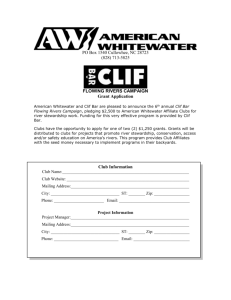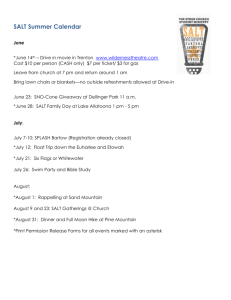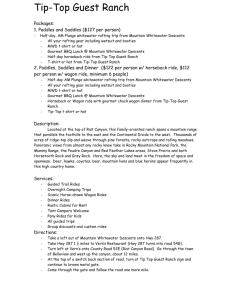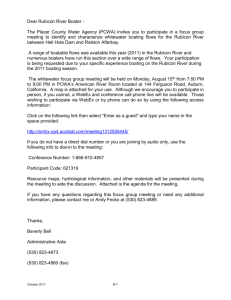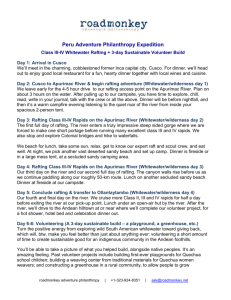McLaughlin Whitewater Design Group
advertisement
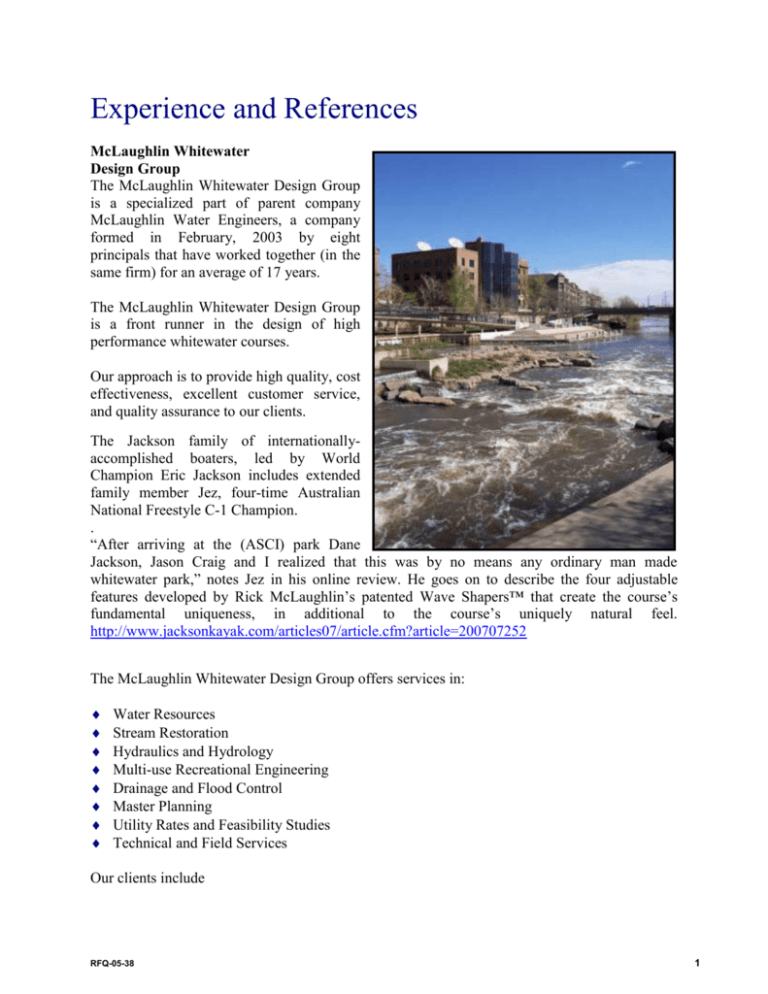
Experience and References McLaughlin Whitewater Design Group The McLaughlin Whitewater Design Group is a specialized part of parent company McLaughlin Water Engineers, a company formed in February, 2003 by eight principals that have worked together (in the same firm) for an average of 17 years. The McLaughlin Whitewater Design Group is a front runner in the design of high performance whitewater courses. Our approach is to provide high quality, cost effectiveness, excellent customer service, and quality assurance to our clients. The Jackson family of internationallyaccomplished boaters, led by World Champion Eric Jackson includes extended family member Jez, four-time Australian National Freestyle C-1 Champion. . “After arriving at the (ASCI) park Dane Jackson, Jason Craig and I realized that this was by no means any ordinary man made whitewater park,” notes Jez in his online review. He goes on to describe the four adjustable features developed by Rick McLaughlin’s patented Wave Shapers™ that create the course’s fundamental uniqueness, in additional to the course’s uniquely natural feel. http://www.jacksonkayak.com/articles07/article.cfm?article=200707252 The McLaughlin Whitewater Design Group offers services in: Water Resources Stream Restoration Hydraulics and Hydrology Multi-use Recreational Engineering Drainage and Flood Control Master Planning Utility Rates and Feasibility Studies Technical and Field Services Our clients include RFQ-05-38 1 Municipalities Cities and Towns Special Districts Commercial and Industrial Interests County, State and Federal Governments Private Citizens Company experience related to conceptual, preliminary and final designs are as follow: Objective Refinement and Innovative Thinking McLaughlin Whitewater Design Group is at the forefront of designing courses to achieve our clients’ vision and meet users’ needs. Adventure Sports Center International in western Maryland challenged MWDG to design a course that would satisfy novice to expert freestyle boaters, novice to expert slalom boaters and rafting customers. Our team accepted the challenge with open arms. We worked hand-in-hand with our client and our equipment manufacturer to include movable features that provide the required adjustments at the touch of a button with the course in operation. Course Construction When clients decide to utilize low maintenance structures we suggest the use of existing techniques of boulder construction in the course design. Boulder Construction Technology - Boulder construction techniques that have been used in many whitewater courses were refined in the 1990s by Rick McLaughlin and other engineers at McLaughlin Water Engineers. They have since been referenced in numerous design manuals and used in designs by design firms, state and federal agencies. We have developed faux rock construction techniques to mimic naturally occurring materials when additional stability is dictated by extreme stream power. For both the Adventure Sports Center International course and the Ocoee we integrated both faux rock and on-site boulders to generate designs that look and feel like natural rivers. Hydraulic Design In order to demonstrate that the course will create no adverse impact and to analyze the course over a wide range of flows, we may recommend computer hydraulic modeling of the existing river and the proposed improvements. Computer Hydraulic Modeling - The McLaughlin Whitewater Design Group is proud of its extensive experience in computer hydraulic modeling. We have conducted floodplain studies, river and creek stabilization designs, and dam removal projects: designed intake structures, drainage and flood control projects: and have completed and analyzed significant physical hydraulic models. As result we have developed a commanding knowledge of one and two dimension hydraulic modeling, and have developed propriety software for wave and hole design. This experience allows us to offer sound, defendable, engineering practice and experience. 2 Floodplain Constraints There are a number of whitewater courses that have caused increases in floodplain elevations or river instability. From a strictly floodplain and hydraulic standpoint, white-water courses are “low-head” dams, and as such, care must be considered with respect to flood and river stability issues. Flood conveyance and related design will therefore take a front-seat in our approach to design. Specific issues may occur at conceptually located structures (downstream of the existing drops) where no hydraulic analysis was completed prior to layout. River Morphology It is common to see the impact of past construction or broad, negative impacts related to the natural morphology of the river. We will evaluate the need for structural bank revetment downstream so that proposed whitewater improvements can function harmoniously with a river’s natural functionality. Durability The majority of recent whitewater courses have experienced failure or significant boulder movement. This instability has required on-going maintenance, with structure replacements and costs. These problems have also lead to safety concerns resulting from the failed structures. Our attention to structure integrity has resulted in long term durability. Good whitewater drops focus flows and may cause instability downstream. Good engineering and innovation are required for a low maintenance course. The course we designed and built for the 1996 Olympics receives unprecedented flood velocities without sustaining damage or movement of boulders. 3 Diversion Intakes and Whitewater McLaughlin Whitewater Design Group has led the way in integrating whitewater courses with diversions and intakes, from small diversions in Pitkin County and in the City of Lafayette, Colorado, to the largest project in the country on the North Fork of the American River. This experience will be valuable to the evaluation of any proposed improvements. This diversion structure on Boulder Creek integrated fish passage, recreation, flow bypass requirements and was required to be passable at high flows. Project Experience Our design team has worked on the design and planning of over 12 whitewater projects in the last 10 years. In addition, our team has extensive experience in multi-use facilities, parks and recreational facilities, and planning, designing and coordinating large scale venues, including some used for the 1996 Olympics. They are still regarded among the best international training facilities today. 4 Some of the McLaughlin Whitewater Design Group’s achievements follow: Olympic Whitewater Venue - Ocoee River, TN, 1995 Concept, Preliminary, and Final Design; Physical Model Study Adventure Sports Center International, MD, 2007 Master Plan, Preliminary, and Final Design; Physical Model Study Glenwood Springs Whitewater Park, 2007 Preliminary, Final Design Vail Whitewater Park Redesign and construction, 2007 Avon, CO Whitewater Park Preliminary Design, Final Design, 2006 Mississippi Whitewater Park, MN, Current Preliminary, Value Engineering, and Final Design (Current); Physical Model Study Chattahoochee Whitewater Improvements, GA, Current Master planning, Preliminary Design, Construction Documents (Current) and Feasibility Study (with the USACE) on largest whitewater project in history American River Restoration & Whitewater Course, CA Master plan, Preliminary, and Final Design, and Value Engineering Study with the Bureau of Reclamation, and Physical Model Studies (2) Colorado Springs Confluence Park, CO, 2000 Preliminary and Final Design of whitewater drops and proposed course Eastside Resort Recirculating Whitewater Course, CA, 1999 Feasibility study for whitewater course. Farad Diversion & Whitewater Course Truckee River, CA, 2002 Alternative Evaluation, Preliminary, and Final Design, and Physical Model Study Fox River Restoration & Whitewater Course, IL Alternative Evaluation and Preliminary Final Design for the Illinois Department of Natural Resources Confluence Park, Denver, CO - Whitewater Course 1995 Final Design and Physical Model Study Horseshoe Bend, ID, 1987 Preliminary and 90% Design Drawings, Model Study, Prototype Evaluation Dickerson Whitewater Course Renovation, MD, 2002 Model Study, Design Santa Fe Avenue - Whitewater Course, CO, 1985 Final Design and Physical Model Study 5 KEY STAFF Our team has extensive experience in hydraulics, drainage and flood control, open channel flow, river restoration, pipelines, small dam and diversion design, and overall system planning. In addition, our team brings familiarity with the project area and the local permitting and hydrologic issues. Our team has historically worked hand-in-hand with clients assigning high value to their input, direction, and knowledge of staff to maintain a long-term approach to the needs and goals. MWDG maintains a broad base of talent with emphasis in all facets of water engineering and most general civil engineering disciplines. Rick McLaughlin, P.E., Principal in Charge MWE. McLaughlin’s experience is chiefly in water resources and environmental engineering and includes recreational whitewater design; drainage engineering; river restoration; closed conduit flow: design of pipelines and diversions, computer modeling, hydrology, hydraulics, and multi-use (recreational and drainage) structures. Drainage and flood control capital improvement projects have included design of lined and unlined channels, culverts, detention facilities, flume and weir structures, raw water diversions, and river intake structures; mathematical and physical modeling of energy dissipaters and subsequent design; and open channel hydraulics. EDUCATION/QUALIFICATIONS M.S. Water Resources Engineering, Stanford University, 1989 B.S. Civil Engineering, Colorado State University, 1982 Registered P.E. Colorado #25762 California #63338 Illinois #184-002169 Maryland #27297 Minnesota #41544 Professional Societies: ASCE, CASFM Rick is also experienced in basin-wide drainage master planning, incorporating hydrology, floodplain and damage analysis, and alternative development. Rick is the engineer of record for the acclaimed Ocoee River, site of the 1996 Olympic slalom events. John Anderson, Whitewater Design John is a former member of the US Whitewater Slalom Team. He was US champion in the C2 Mixed class in 1987. His designed the Dickerson whitewater course in 1991, taking advantage of donated goods and services for nearly 90 percent of the project costs. He was the “whitewater architect” for the Ocoee River, Tennessee, site of the 1996 Olympic Games. At its opening, the site was hailed as the “best in world.” It has since been chosen for two World Cup Slalom races. a World Championship event, and national whitewater freestyle events. EDUCATION/QUALIFICATIONS B.S. Architecture, University of Virginia, Professional Registration: Virginia #5929 Maryland #9316 Georgia #RA011020 John has designed 16 whitewater projects in his career including the Adventure Sport Center in Maryland, the first course in the world to utilize fully adjustable whitewater wave features. In 2004, he added physical hydraulic modeling services at his facility in Virginia for projects in need of a quick turn-around or abbreviated testing schedule. John is an architect registered in Virginia, Maryland and Georgia. 6 Aaron Asquith, P.E., Project Engineer Aaron has become highly experienced in the areas of hydraulic and hydrologic modeling, sediment transport and scour analysis, physical model design, construction and testing, as well as surveying, materials testing, hydrologic evaluations, grading and site plans, storm, water and sanitary pipeline design, manual and AutoCAD drafting, and, construction phase services. He has served as a construction inspector project engineer and project manager for numerous whitewater and multi-use projects in Colorado, California, Maryland, Wyoming, South Dakota and Illinois and has prepared permit applications, field surveys, and construction documents. He is proficient in Excel, Word, HEC-I, HEC-II, GSTARS, QUAL2E, FlowMaster, SMS, RMA2, MathCad, AutoCAD, Softdesk, Surfer, ArcView and ArcInfo. EDUCATION/QUALIFICATIONS M.S. Civil Engineering, South Dakota School of Mines and Technology, 1999 B.S. Civil Engineering, South Dakota School of Mines and Technology, 1998 Registered P.E. Colorado 36602 Professional Memberships: Colorado Association of Storm and Floodplain Managers - Denver Regional Representative ASCE Order of the Engineer Tau Beta Pi Aaron was the project engineer for the Adventure Sports Center whitewater course which utilizes pneumatically adjustable, patented Wave Shapers™. Risa Shimoda, Recreation Specialist EDUCATION/QUALIFICATIONS B.S. Stanford University, Product Design (General) Engineering 27 years outdoor recreation leadership Project Responsibility: Risa will assess the recreational opportunities recommended by the whitewater park initiative from the standpoint of meeting expectations and risk management responsibility, and facilitate public interaction to assist the client in making informed decisions. She will be the primary contact for the McLaughlin Whitewater Design Group. Risa Shimoda is a product design engineer (Stanford University) trained professionally in marketing at Procter & Gamble, M&M/Mars and Coca-Cola USA. She led the marketing, sales and product development for Perception kayaks and gear and served as the Executive Director for American Whitewater. She has served on the boards of the Trade Association of Paddlesports, American Whitewater, Nantahala Outdoor Center, National River Cleanup Week, the International Whitewater Hall of Fame, and the US Freestyle Kayaking. Shimoda instituted a vendor marketplace for the largest gathering of paddlers in the US; founded a 40-event freestyle event organization (National Organization of Whitewater Rodeos -NOWR); and produces the biennial conference that provides networking opportunities for whitewater course project leaders. She has raced slalom kayak and C2M (mixed double canoe) and has been a member of the US Whitewater Freestyle Team, representing the United States in the World Freestyle Championships six times (1993-2007). 7 REFERENCES OCOEE RIVER, NEAR CHATTANOOGA, TN Modified river channel for Olympic Competition. Located within natural river bed, constructed of natural materials and built to withstand 50,000 cfs flood events. USDA Forest Service, Southern Region Cherokee National Forest 2800 Ocoee N. Street Cleveland, TN 37312 Paul Wright (ret.) (423) 344-5630 Services Provided: • Public input • Alternative analysis • Hydraulic design and computer modeling (HEC 2) • Physical modeling • Plans and specifications • Construction observations and on-site assistance with boulder placement MISSISSIPPI WHITEWATER PARK FEASIBILITY STUDY Whitewater bypass at Corps of Engineers, St. Anthony Falls Lock and Dam on the Mississippi River. 1800’ channel, inlet gates, outlet works within park setting. Minnesota DNR, Trails and Waterways Unit DNR Building - 500 Lafayette Road St Paul, Minnesota, 55155-4052 Michael McDonough, former Project Manager with Minnesota DNR, (651) 602-1054 Cindy Wheeler: (current PM, was not on project at time of our services) (651) 296-0735 Additional Reference: Bill Tilton, Mississippi Whitewater Park Development Corp. (651) 224-7687 Services Provided: • Public input • Alternative analysis for whitewater course • Schematic plans for surrounding park (by sub consultants) • Economic feasibility / economic impact (by sub consultants) • Pre-design for architectural support buildings • Illustrations (by sub consultants) Project underwent EDR by St. Paul District Corps of Engineers in 2001. Contact Kent Hokens. 8 CONFLUENCE PARK, DENVER, CO Dam bypass and dam safing at low head water intake dam. Open channel 400 feet long with 8 feet of drop and pneumatic entrance gates. Dam is step configuration with massive roughness elements to break up deadly roller. Lowered regulatory flood plain by one foot. Urban Drainage and Flood Control District 2480 West 26th Ave. Suite 156-B Denver, Colorado 80211 Bryan Kohlenberg, 303-455-6277 Services Provided: • Hydraulic modeling (HEC-2) • Physical modeling • Full hydraulic and civil design • Landscape architecture (by sub-consultants) • Construction observation ADVENTURE SPORTS CENTER INTERNATIONAL Self-contained pump-recirculation whitewater course with adjustable gates, pump station, rafting support buildings and related site work. Client: Adventure Sports Center, Inc. 685 Mosser Road, Suite 22, McHenry, MD 21541 Brian Trusty (301) 387-3250 Services Provided: • Alternative analysis and site master plan for whitewater course • Full A/E design of whitewater course • Full A/E design of 600 cfs pump station • Hydraulic design • Physical modeling • Full A/E design for rafting support buildings 9 Staff Availability and Approach Staff Availability and Responsiveness Most of our clients require continuing services. These clients rely on our high quality services to be completed in a timely fashion. Likewise, our clients can also count on completion of projects and various tasks according to schedules established with each task order. McLaughlin Water Engineers is staffed and operated to accomplish this level of service. First, our project load is arranged to include both large and smaller projects. By including a balance of each, we can better accommodate new projects that can arise with short notice. Second, we keep our staff loading at levels that can accommodate durations of more output so that we can meet the occasional short term or rapid deadline project. Our historic total company project loading is approximately 70 percent, somewhat less than this average. Effective Management Successful completion of projects within given timelines usually requires effective project management. We will incorporate the following measures into our approach based on a typical scope. Develop a Partnership with the Client. Developing a “partnership” project approach with the client will facilitate efficient work progress, development of effective solutions, allow for informed decision making, and produce a final work product that meets or exceeds expectations. Clearly Define Lines of Communication and Recordkeeping Protocols. Project lines of communication and protocols for the storage of communication records, data files, and work progress will be defined at the initiation of the project. These protocols will be disseminated to all project staff to ensure accurate record-keeping and efficient use of data. Tracking Project Progress. Regularly scheduled project update meetings with the client will be the primary forums to ensure that efficient and effective progress is made. Critical path items will be identified in the first meeting. The minutes will include all action items and identify Project Team members responsible for carrying out the specific action items. Status of the action items will be addressed at the beginning of the next meeting, the client will be provided updates of project progress in the form of status memorandums. Tracking Project Budgets. Budget information will also be reviewed on a monthly basis by comparing project expenditures to the completed work using budget information. The Project Manager will meet with staff on a monthly basis to review task budgets and, if necessary, initiate control measures. Review of Work Products. The responsibility and protocols for project review and quality control will be assigned early in the process. This will include review and approval of all technical methods and work products prior to submittal to track consistency with project goals, objectives, and timeline. 10 Quality Control and Methodology Our methodology for quality control of our projects is simple and straightforward. The process begins early in the project when assigning resources, including project management and project engineering teams. Teams are selected on a per project basis, based on individual experience and areas of expertise. In addition, our small company philosophy allows free exchange of ideas on technical decisions. Even our most technically competent engineers consult with several other in house experts during critical project decisions. This ability to “bounce ideas off” of other team members allows us to achieve sound decisions based on sound engineering judgment. In addition to use of our company personnel as technical resources throughout the development of each of our projects, MWDG maintains a strict philosophy on Quality Control of work products. Prior to the release of a draft, preliminary, or final work product we complete an independent technical review. Work is checked by an engineer technically qualified in the appropriate field before holding a final design meeting of the project manager, project engineers, and the project checker. During this meeting, recommended changes and alternatives are discussed and a consensus is reflected in the final product. 11


